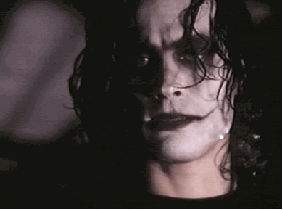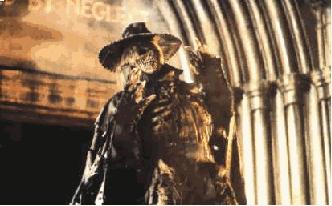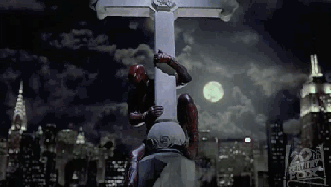

|
The War In Heaven |
|
The term "fallen angel" is used to describe someone who has fallen from grace. This implies the person was, at one point, virtuous or lived in a state that could be called heaven. The three characters profiled here could each be called angels, but it must be stressed that they are different types of angels. While the common view is that angels are messengers of a Supreme Being, this is not the only type of celestial host. Daredevil, Eric, and Anakin are each a different type of angel. At first glance, it might be tempting to label them devils or demons, but both terms would be incorrect. In fact, the words themselves have different origins than what most people think. The word "devil" comes form the Greek diabolas, which means "to throw across, slander," while demon comes from the Greek word daemon, which means "spirit" (Sisury 131). Demons only became the Devil's helpers and minions in later Christian mythology. If there is anyone that might be called the Devil, though, it would be Anakin. The story of Lucifer, or at least one version, is that he was an archangel, a leader of the heavenly host. Some say he even sat at the right hand of God. On the second day after Creation, though, Lucifer grew full of pride and sat on the throne of God. For his sin, Lucifer and all who helped were cast out of heaven and into hell. Anakin's story is similar. After he betrays the Jedi Order and marries PadmÚ Amidala, he grows more and more prideful. Many Jedi, including Mace Windu, a member of the Jedi High Council, noted how Anakin had "exceptional skills" and Palpatine commented that he didn't need training since he was "quickly becoming the greatest of all Jedi". Like Lucifer, Anakin was a shining beacon for those around him, other Jedi (angels). After the Republic falls, he rules the Empire (hell) with his master. Anakin's fall, like Lucifer's also mirror's humanity's fall from grace. When Adam and Eve tasted the forbidden fruit after being told they were like gods, they were expelled from paradise. When Lucifer's pride got the best of him, he was expelled from heaven. Anakin, though, took it one step further and actually helped turn heaven into hell for his love of something forbidden. Anakin, therefore, is Lucifer. Like his namesake, Daredevil could easily be called a demon. However, "devil" has a complex history. The root for devil "has the same Indo-European root as the Hindu-Buddhist term deve, which is roughly approximate to the Western Angel" (Sisury 132). Unlike Anakin, at least, Daredevil tried to do good and help others. Why then, did he routinely call himself a devil? In a short scene cut from the bar room brawl, he shouts "Time to give the devil his dues," and he calls himself "a guardian devil." The answer lies in what a devil is, not what we usually perceive it to be. Like angels, devils have many types. In early Greek mythology, devils were spirits that could be good or bad, but didn't need to be either one by default. Christianity changed it later (Sisury 132). According to one version of the war on Heaven, those angels who refused to fight for God were banished to punish the souls of sinners in Hell. Daredevil's home, Hell's Kitchen, is often times reminiscent of some versions of hell. Sinners wander the street and suffering is rampant. But when did Matt Murdock fall from heaven? What condemned him to punish sinners? In his case, it was his father's pride that made him fall from grace. After Jack "The Devil" Murdock refused to throw a fight in order to not loose face in front of his son, Matt would spend the next several years fighting the street demons of New York. As he lets one "sinner" die, Matt yells to him, "Hey, that light at the end of the tunnel? Guess what? That's not heaven. That's the C-train." The fall from grace made Matt a classical demon. That leaves Eric. It would be tempting to say that the Crow is also a classical demon, punishing sinners while exiled in hell. However, Eric doesn't fit the profile. He didn't fall because of pride. He was killed while trying to save his fiancÚ. He may in fact be a demon in a much older meaning of the word. Early Christians believed that demons were not banished from heaven because they opposed God. They were banished because they loved and took human wives. These pairing were briefly alluded to in Genesis 6:2. The analogy, though, isn't perfect. Eric's love for Shelly is what lets him return to the land of living in order to exact revenge. In a way, though, his love for her is what got him killed. Early Christians, though, also had another belief that differed from modern Christianity. They believed "that stern, righteous angels tormented them damned" (Sisury 133), not banished angels. For a year before he returned, Eric may have been in Heaven, or at least some type of Purgatory. Once he returned to Earth, Eric was given free-reign over his aggressors, as long as he stayed out of the affairs of the living. A sub-plot, though, found in the original screenplay and comics did not make it into the final movie. Some scenes, though, were filmed. A character known simply as the Skull Cowboy was Eric's guide through parts of the movie, telling him why he was put on Earth: to avenge the wrongs done against him and not help the living. Once his mission finished, he would loose his powers. In the scene where Eric kills Funboy, there was a scene filmed but later dropped where Fun Boy got a razor and cut Eric after he helped a woman return to her daughter after years of drug abuse. In the ensuing scuffle, Fun Boy wounds Eric so the damage doesn't heal. Later scenes showed Eric with electrical tape around his wrists and chest, showing where the damage was done. When Eric is shot at the end of the movie, it is supposed to be because his mission was over, not because the crow was shot. In other words, Eric had a clear mission: the punishing of sinners. He did it not because he fell from grace, but rather because he was allowed to. The Crow, then, is an ancient angel in charge of hell. The term "fallen angel" is used to denote someone who fell from grace. The concept of angels, though, is a long, complex history. There are as many types of angels as there are devils, and sometimes there are those creatures who walk a fine line between heaven and hell. The heroes on this site, all of them true fallen angels, are such creatures. |
|
The Crow / Eric Draven | Daredevil / Matthew Murdock | Anakin Skywalker / Darth Vader | Essays | Sources | Links |





